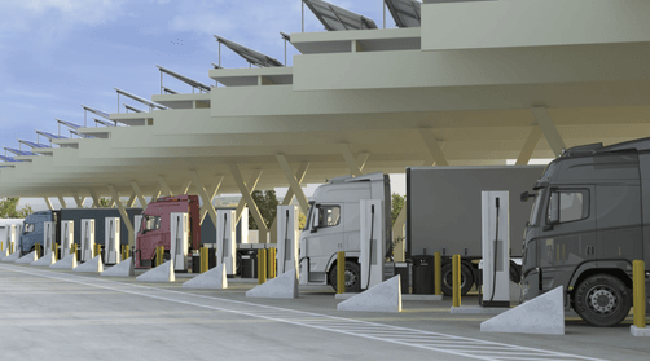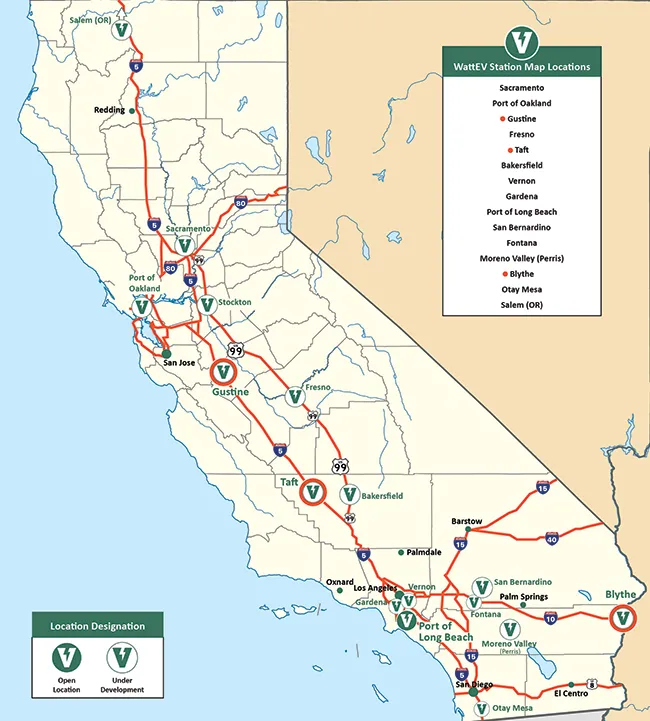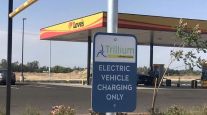Staff Reporter
FHWA Awards Grants to Develop Charging, Hydrogen Stations

[Stay on top of transportation news: Get TTNews in your inbox.]
Eyeing heavy truck emissions, the Federal Highway Administration has awarded nearly half of $622.57 million in new infrastructure grants to megawatt and kilowatt charging and hydrogen fueling projects in California, Washington, Colorado, Texas and New Mexico.
Charging and Fueling Infrastructure Program grants will be given to 47 applicants in 22 states for strategic deployment of urban and rural public electric vehicle charging and alternative fuel infrastructure.
The funding was split with $311 million going to 36 community projects (schools, parks, libraries and multifamily housing). The remaining funds will be spent on 11 alternative fuel corridor ventures located along key roadways to “fill gaps in the core national charging and alternative-fueling network,” according to the U.S. Department of Transportation.
Some of the electric battery charging projects for heavy trucks didn’t list whether power would come from today’s mainstay kilowatt EV chargers, but others identified megawatt chargers to be deployed. No widespread, standardized megawatt charging system that is interoperable exists in the United States for electric heavy trucks, which are in their infancy.

The largest EV charging grant ($63.8 million) went to the New Mexico Department of Transportation to build two medium- and heavy-duty truck EV corridors along Interstate 10 near Lordsburg and Vado in unincorporated Hidalgo and Doña Ana counties.
Each center will have nine pull-through stalls along an I-10 Electric Corridor, which is meant to be the nation’s first network of high-powered charging centers for heavy-duty trucks from the ports of Long Beach and Los Angeles to El Paso, Texas.
NMDOT has contracted with San Francisco-based TeraWatt Infrastructure to design, build, operate and own both charging centers that will provide 300 truck charges daily.
Another I-10 project will receive $19.6 million in an FHWA award to the city of Blythe in California near the Arizona border. The city has partnered with Long Beach-headquartered WattEV to build its I-10 truck charging terminal as a public, multiclass EV charging station in Riverside County. It will be located halfway between Los Angeles and Phoenix on the I-10 corridor. The Blythe facility will be built on a 127-acre parcel of land. It will have six megawatt chargers for heavy-duty trucks, 30 direct-current fast chargers for light-duty vehicles, and solar and battery energy storage systems. It will also feature rest area amenities and bathrooms.
When completed, the Blythe facility will be able to charge more than 46,000 trucks annually with 30 kilowatt chargers, and 38,000 trucks with the six megawatt chargers.

Youssefzadeh
Reacting to the grant, WattEV CEO Salim Youssefzadeh said his company is leading the industry in adoption of megawatt charging for “rapid recharging at our depots for semi-trucks, with as much as 300 miles of range in just 20 minutes.” He predicted that megawatt charging “will fundamentally shift the way that truck drivers view the viability of electric trucks for longer freight routes.”
Megawatt chargers are part of a $56 million grant for an I-5 electric freight corridor given to the San Joaquin Valley Unified Air Pollution Control District in Modesto, Calif. The I-5 corridor is a major San Joaquin Valley freight corridor connecting the southern and northern parts of California.
The district is partnering with WattEV to build truck charging sites in Taft and Gustine, Calif. The charging stations will have a total of 90 DC fast chargers for passenger vehicles, 85 DC fast chargers for medium-duty EVs and 17 megawatt chargers for heavy trucks. Amenities will include public bathrooms, a rest area and free parking.
In Washington state, the Northwest Seaport Alliance will receive $12 million to develop at least one shared electric truck charging hub to serve a network of 4,500 heavy-duty trucks that haul cargo to the ports of Seattle and Tacoma.
California was also awarded two hydrogen fuel projects. Victor Valley Transit Authority in San Bernardino County will receive $12 million to build a hydrogen fueling station and six DC fast charging stations for its fleet and the public. With a storage capacity between 18,000 and 25,000 gallons, the hydrogen fueling station will support light-, medium- and heavy-duty vehicles.
Want more news? Listen to today's daily briefing above or go here for more info
Another hydrogen grant ($7.15 million) was awarded to California State University-Los Angeles to transform its hydrogen research and fueling facility into a high-capacity, multimodal light- to heavy-duty vehicle hydrogen fueling station to serve multiple public customers and fleets, including the ports of Long Beach and Los Angeles
Elsewhere, Colorado State University was awarded $8.97 million to build a network of three public hydrogen fueling stations near I-25 at the university’s campuses in Fort Collins, Denver and Pueblo. The project calls for providing hydrogen fuel for medium- and heavy-duty vehicle fleets and future light-duty passenger vehicles.
In Texas, a $70 million grant to the North Central Texas Council of Governments will pay to build up to five hydrogen fueling stations for medium- and heavy-duty freight trucks in Dallas-Fort Worth, Houston, Austin and San Antonio. The goal is to create a hydrogen trucking corridor from Southern California to Texas.




